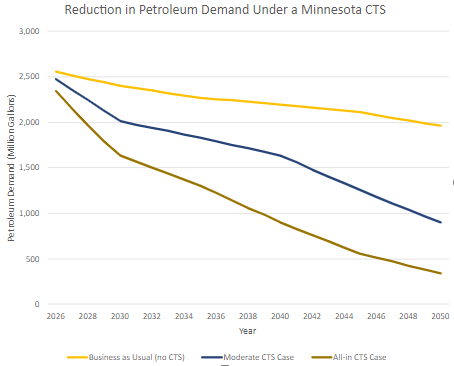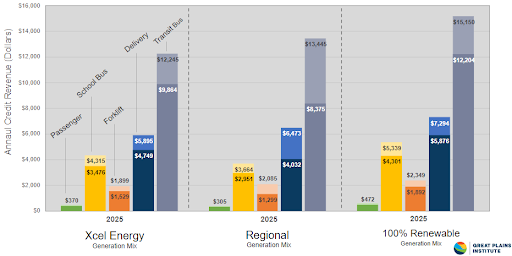
Move over, electricity generation, there’s another Minnesota sector emitting the most greenhouse gases in the state: transportation. The way we transport people and goods across the state now generates about one-quarter of our total greenhouse gas (GHG) emissions, the largest source in Minnesota. The agricultural sector is close behind, emitting the second-highest emissions from livestock, feedlots, fertilizer, and more. As Minnesota takes significant steps toward meeting its GHG reduction goals, it’s time for bold policy solutions to lower transportation and agricultural emissions.
Fresh Energy has long helped Minnesota adopt forward-looking policies to reduce emissions. We made historic progress during the 2023 legislative session when the Minnesota Legislature passed the 100% Clean Electricity law that ensures Minnesotans will receive 100% carbon-free electricity to power their lives by 2040. Policies like this have rapidly decreased emissions in the electricity sector, but we can’t slow down: we need other sectors to rapidly decarbonize, too.
To meet Minnesota’s climate goals, ambitious policy is required to create more clean and affordable transportation choices that meaningfully reduce emissions. Simultaneously, we also need to incentivize and scale regenerative agricultural practices and feedstocks to lower nitrous oxide and methane emissions while improving water quality and soil health. That’s where a clean transportation standard comes in.
Fresh Energy and partner organizations have been working on a clean transportation standard (CTS) for several years. This legislation is a future-focused transportation policy that will reduce the amount of greenhouse gas emissions generated by transportation fuels while simultaneously decreasing petroleum use, accelerating equitable vehicle electrification, reenvisioning outdated biofuels policy, and more. It would set a statewide carbon intensity target and assign a score to each type of transportation fuel type based on the carbon intensity of that fuel, including gasoline, biofuels, and electricity, to ratchet down the carbon intensity of our transportation emissions over time.
Keep reading to understand the details of how a clean transportation standard will reduce emissions in Minnesota and how other states have already benefitted from it.
How a clean transportation standard works
A clean transportation standard is a market-based policy that provides incentives for fuel sources with low-lifecycle carbon emissions. Minnesota’s CTS could provide between $134 million and $268 million for transportation electrification annually by 2030, based on an analysis by ICF for the Clean Transportation Standard Work Group.
To do this, fuels are assessed to determine their carbon intensity using standards that Minnesota can adjust via rulemaking to meet our state’s needs. Cleaner fuels (those not derived from fossil fuels) will generate credits for the producer that can be kept or sold to producers of high-carbon fuels. Fuels with a carbon intensity above the standard will generate deficits for the producer. Those producers must then offset the deficit with the purchase of credits.
This market mechanism rewards the lowest-carbon fuels (such as electricity) while directing a portion of credit revenue toward investments in electric vehicle (EV) infrastructure and rebates to help accelerate equitable EV adoption across Minnesota.
“The clean transportation standard is essential to equitably decarbonizing the transportation sector in Minnesota while also ensuring input from a variety of stakeholders to properly set standards in a way that meaningfully reduces emissions,” said Margaret Cherne-Hendrick, senior lead, innovation and impact at Fresh Energy. “For Minnesota to meet its emission reduction targets, we must rise to meet the scale of the challenge. This bill will give consumers, industry leaders, farmers, and all Minnesotans the process and tools needed to reduce emissions in the transportation and agriculture sectors.”
A Clean Transportation Standard will create a cleaner future for Minnesotans
A Minnesota CTS will create a cleaner Minnesota in four anticipated ways.
First, petroleum production is expected to sharply decline, as compared to a business-as-usual case without a CTS. Modeling shows that petroleum production could be reduced by 64-86% by 2050 (see chart below).

Second, a Minnesota CTS will result in less ethanol production. Currently, ethanol is only sold as a blend with gasoline. Because a CTS will shrink the gasoline market as a whole by driving accelerated vehicle electrification, it will in turn reduce ethanol consumption in the light-duty vehicle market.
Third, a Minnesota CTS will accelerate EV adoption by providing significant, ongoing funding for electrifying transportation in the state, in turn allowing it to grow more swiftly and equitably. The CTS will consider electricity use in all electric vehicles (EVs) a “low carbon fuel” and generate credits accordingly, which can be used to fund EV infrastructure and rebates with an emphasis on under-resourced and rural communities. This funding can benefit environmental justice communities in many ways, like supporting diesel pollution reduction and increasing access to EV charging.
The greatest potential revenue from this credit program lies with electrifying transit buses, delivery services, and school buses, no matter the electric utility’s generation mix that is used to charge them. (See Chart 2 below)

Finally, the Minnesota CTS would be the first in the country to provide incentives for adoption of climate-smart agricultural practices. This includes reducing tillage, utilizing cover crops, and better managing nitrogen, all of which would lower the GHG emissions and water impacts of agriculture.
By reducing both petroleum and ethanol production, incentivizing climate-friendly agricultural practices, and using a credit program to speed the electrification of the transportation sector, the Minnesota CTS will reduce greenhouse gas emissions while accelerating an equitable, electric future.
Other states have benefitted from a clean transportation standard
Minnesota isn’t the first state to recognize the benefits of a CTS. Since 2016, the Oregon Clean Fuels program has reduced more than 9.2 million tons of greenhouse gases and displaced 2 billion gallons of fossil fuels. Additionally, it lowered ethanol consumption and enabled the state’s utilities to invest almost $50 million in EV projects.
Similarly, California’s Low Carbon Fuel Standard has reduced 38.3 million tons of greenhouse gases and grew electricity use in the transportation sector from 0.5% to 4.5%. In 2022 alone, the California Low Carbon Fuel Standard generated $789 million to support transportation electrification.
In 2021, Washington passed its Clean Fuel Standard into law to join California and Oregon. Fresh Energy looks forward to reviewing its inaugural annual report in April 2024 to learn how the program has reduced GHG emissions and invested in a cleaner transportation future.
What’s next
Fresh Energy is currently supporting the clean transportation standard bill in the Minnesota legislature. It was originally introduced in 2023 and will be amended this year.
The passage of this bill would set the stage for Minnesota to dig into the nitty-gritty details of establishing a CTS that fits our state’s needs. The bill at the Minnesota Legislature ensures the CTS can be the strongest policy possible and launch an administrative rulemaking process for the technical nuts and bolts to get hammered out with stakeholders and sector experts to provide filings in the public record. The bill will establish the Minnesota Department of Transportation as the agency lead with support from the Minnesota Pollution Control Agency and the Minnesota Department of Agriculture.
Stay tuned as Fresh Energy monitors and helps advance the CTS bill in the Minnesota Legislature this spring! To stay up to date on Fresh Energy’s latest policy initiatives and news, be sure to sign up for our monthly Powering Progress newsletter as we build an equitable, decarbonized Minnesota.
